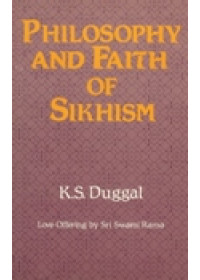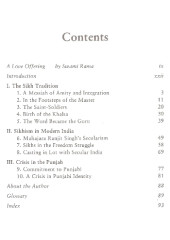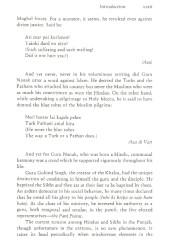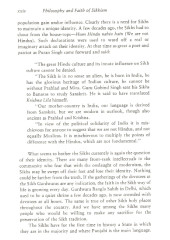Monday to Saturday - 10:00 Am to 9 PM
Now Enjoy Bulk Discounts on Books as Mentioned Below
These Discounts are in addition to the Discounts on Individual Books (Visible as Bulk Discount for Books in Cart)
Extra 10% Off If Books Purchased Exceeds Rs 3000 or 75 USD or 60 GBP or 60 Euro or 100 AUD or 100 CAD
Extra 15% Off If Books Purchased Exceeds Rs 6000 or 150 USD or 120 GBP or 120 Euro or 200 AUD or 200 CAD
Extra 20% Off If Books Purchased Exceeds Rs 15000 or 225 USD or 180 GBP or 180 Euro or 300 AUD or 300 CAD
Extra 25% Off If Books Purchased Exceeds Rs 30000 or 300 USD or 240 GBP or 240 Euro or 400 AUD or 400 CAD
Modern India has a secular constitution where the law of the land equally respects all religions.
Mahatma Gandhi, father of the nation, was a Hindu and yet he studied and venerated other religions whose hymns were regularly recited at his prayer-meetings. These included Buddhism, Jainism, Christianity, Islam, Zoroastrianism, and Sikhism. Jawaharlal Nehru professed himself a non-believer and yet he visited places of worship with the apparent devotion of his countrymen. He was invested with the sacred thread as a child and Vedic ceremonials were duly observed at his cremation and to his memory. Mrs. Indira Gandhi's spiritual thirst carried her to any locale where she could find peace of mind, whether at a Hindu, Muslim, or Sikh holy place.
Within this context of many religions, Sikhism is the most modern, the most recent, and the most scientific faith amongst the great religions of the world. Its founder, Guru Nanak, had the advantage of having drunk deep at the founts of all the sacred religious lore. A life long pilgrim, he visited the ancient Hindu temple at Puri in the east, Holy Mecca in the west, the ascetics at Manasarovar deep into the Himalayas in the north, and in the south the Buddhist shrines in Sri Lanka. Venerated equally by the Hindus and the Muslims in the Punjab, he is still remembered as Baba Nanak Shah Faqir/Hindu da guru, Musalman da pir ( a great Sufi, revered guru of Hindus, pir of Muslims).
Guru Nanak lived through the harrowing experience of a Mughal invasion of the Punjab by Babar. This cruel invader murdered, raped, and recklessly destroyed property. The poet in Guru Nanak fearlessly condemned the atrocities committed by the Mughal forces. For a moment, it seems, he revolted even against divine justice. Said he:
Arti mar pai Kurlanen!
Tainki dard no aiya?
(Such suffering and such wailing!
Did it not hurt you?)
And yet never, never in his voluminous writing did Guru Nanak utter a word against Islam. He decried the Turks and the Parhans who attacked his country but never the Muslims who were as much his countrymen as were the Hindus. On the other hand, while undertaking a pilgrimage to Holy Mecca, he is said to have donned the blue robes of the Muslim pilgrims:
Neel bastar lai kapde pehre
Turk Pathani amal kiya
(He wore the blue robes
The way a Turk or a Pathan does.)
And yet for Guru Nanak, who was born a Hindu, communal harmony was a creed which he supported vigorously throughout his life.
Guru Gobind Singh, the creator of the Khalsa, had the unique distinction of combining in himself the guru and the disciple. He baptized the Sikhs and then sat at their feet to be baptized by them. An ardent democrat in his social behaviour, he many times declared that he owed all his glory to his people (Inhi ki kripa se saje ham hain). At the close of his ministry, he invested his authority as a guru, both temporal and secular, in the panth, the five elected representatives-the Panj Piaras.
The current tension among Hindus and Sikhs in the Punjab, though unfortunate in the extreme, is no new phenomenon. It raises its head periodically when mischievous elements in the population gain undue influence. Clearly there is a need for Sikhs to maintain a unique identity. A few decades ago, the Sikhs had to shout from the house-tops-Hum Hindu nahin hain ( We are not Hindus). Such declarations were used to ward off a real or imginary attack on their identity. At that time as great a poet and patriot as Puran Singh came forward and said:
"The great Hindu culture and its innate influence on Sikh culture cannot be denied.
"The Sikh is in no sense an alien, he is born in India, he has the glorious heritage of Indian culture, he cannot be without Prahlad and Mira. Guru Gobind Singh sent his Sikhs to Banaras to study Sanskrit. He is said to have translated Krishna Lila himself.
"Our mother-country is India, our language is derived from Sanskrit, but we are modern in outlook, though also ancient as Prahlad and Krishna.
"In view of the political solidarity of India it is mischievous for anyone to suggest that we are not Hindus, and not equally Muslims. It is mischievous to multiply the points of difference with the Hindus, which are not fundamental."
What seems to brother the Sikhs currently is again the question of their identity. There are many front-rank intellectuals in the community who fear that with the onslaught of modernism, the Sikhs may be swept off their feet and lose their identity. Nothing could be farther form the truth. If the gatherings of the devotees at the Sikh Gurdwaras are any indication, the faith in the Sikh way of life is growing every day. Gurdwara Bangla Sahib in Delhi, which used to be a quiet shrine a few decades ago, is now crowded with devotees at all hours. The same is true of other Sikh holy places throughout the country. And we have among the Sikhs many people who would be willing to make any sacrifice for the preservation of the Sikh tradition.
The Sikhs have for the first time in history a State in which they are in the majority and where Punjabi is the main language. This is something which even the great Maharaja Ranjit Singh could not claim for the community. It is time to make the best of this opportunity rather than fritter away the fund of the community's energies in vain pursuits.
I hurriedly wrote this book to respond to the mounting tension in the Punjab which started with the clash between the Akali and Nirankari factions at Amritsar and then spread to embroil the entire State. Inevitably this tension has taken the all too familiar form of community versus community.
The Sikhs are a "spirit-born people" who have a noble heritage which would give pride to any community. They are hard-working and enterprising. They are friendly and forward-looking, imbued with a rare spirit of self-sacrifice. It is their endeavor mainly that has helped the country turn the corner in food production. Guarding a sensitive border, they are the virtual sword arm of India. Their contribution in the freedom struggle is unique. Their sacrifices are legendary in various conflicts with intruders into independent India, whether they came from the north-east or the north-west. They are always in the forefront of every national endeavor. It hardly becomes a people with their great past and no less glorious present to tarnish their image with narrow and parochial considerations.
Part of this text was previously published in The Tribune, a leading newspaper of the Punjab. It is hoped that this book will serve all readers in India and abroad so that they understand the great Sikh tradition with all its profundities.
|
Contents |
||
|
A Love Offering by Swami Rama |
ix | |
|
Introduction |
xxii | |
| 1. | The Sikh Tradition | |
| 1. | A Messiah of Amity and Integration | 3 |
| 2. | In the Footsteps of the Master | 11 |
| 3. | The Saint - Soldiers | 20 |
| 4. | Birth of the Khalsa | 30 |
| 5. | The Word Became the Guru | 39 |
| II. |
Sikhism in Modern India |
|
| Maharaja Ranjit Singh's Secularism | 49 | |
| Sikhs in the Freedom Struggle | 58 | |
| Casting in Lot with Secular India | 69 | |
| III |
Crisis in the Punjab |
|
| 9. | Commitment to Punjabi | 77 |
| 10. | A Crisis in Punjabi Identity | 81 |
|
About the Author |
88 | |
|
Glossary |
89 | |
|
Index |
93 |
| Books | |
| Author | K.S Duggal |
| Pages | 100 |
| Cover | Paperback |
| Language | English |
Philosophy and Faith Of Sikhism - Book By K S Duggal
- Brand: Singh Brothers
- Product Code: SPE144
- Availability: In Stock
-
Rs.150.00
Related Products
The Sikh People - Yesterday & Today - Book By K S Duggal
Introduction To 'The Sikh People' By K.S. Duggal Modern India has a secular constitutio..
Rs.85.00
Sikhs We are Not Hindus - Book By Bhai Kahn Singh Nabha
Introduction To Book 'Sikhs We Are Not Hindus' Book By Bhai Kahnn Singh Nabha Interacti..
Rs.180.00
The Great Glory Sikhism - Book By Sandeep Goswami
The Great Glory Sikhism - Text by Sandeep Goswami - Photographs by Malkiat Singh The Great ..
Rs.1,950.00
The Heritage Of The Sikhs - Book By Harbans Singh
Introduction To 'The Heritage Of The Sikhs' By Harbans Singh The word sikh goes back to Sansk..
Rs.450.00
The Japji And The Rehras - Book By Khushwant Singh
Summary of 'The Japji And The Rehras' By Khushwant Singh I am not a religious man, but I ca..
Rs.495.00
Berkeley Lectures On Sikhism - Book By Harbans Singh
Summary of 'Berkeley Lectures On Sikhism' By Harbans Singh The recent tragic events in the Pu..
Rs.125.00
On Sikh Personal Law - Book By Kharak Singh
Foreword To The Book 'On Sikh Personal Law' By Kharak Singh A section of Hindus has nev..
Rs.75.00
Tags: books concepts of sikhism, books on gurbani essence, books on gurmat philosophy, books on message of gurbani, books on rehat maryada, books on sikh attributes, books on sikh faith, books on sikh identity, books on sikh ideology, books on sikh philosophy, books on sikh qualities, books on understanding gurbani duggal, english













